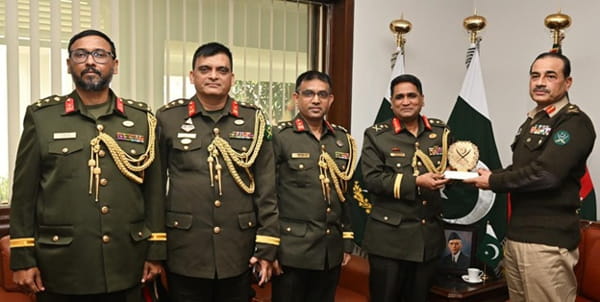
Representative image.

A Pakistan-Bangladesh relationship founded on anti-Indianism is bound to be an aborted exercise. There is not much Pakistan can do for the development of Bangladesh, except use Bangladesh to advance its security interests with India. Such an approach will make Bangladesh more rather than less vulnerable and secure. Besides, the Interim Government’s hasty rapprochement with Pakistan is more opportunistic than strategic, and does not reflect the interests of the people of Bangladesh.
Introduction
Following the fall of Sheikh Hasina’s government in August 2024, improvement in relations between Bangladesh and Pakistan emerged as a source of anxiety in India. Earlier in a statement, the Indian Army Chief had also voiced his apprehension, saying, “I am concerned.”Over the past few months, this relationship has steadily improved, facilitated by numerous bilateral visits between officials, defence personnel, and trade officials, as well as direct trade shipments.
The terrorist attacks in Jammu and Kashmir on April 22 which were carried out by a Pakistan-based Lashkar-e-Tayyaba faction targeting tourists have intensified Indian apprehensions about rising fundamentalism. Channels of communication remained open between Pakistani and Bangladeshi officials during the escalation of hostilities between India and Pakistan. Against this backdrop, the planned visit of Pakistani Deputy Prime Minister Ishaq Dar to Bangladesh, scheduled for April 27-28, was cancelled. Earlier, Foreign Office Consultations were held in Dhaka by Pakistan’s Foreign Secretary Amna Baloch, during which Bangladesh formally requested a Pakistani apology for the 1971 genocide. Pakistan’s response was minimalistic and proforma, enough to enable the start of the reset of the relationship which both governments are keen on.
Regime change in Bangladesh has provided an opportunity to Pakistan to reduce its regional isolation. Simultaneously, Bangladesh’s Interim Government, claiming to pursue a policy of balanced foreign relations has extended its outreach to Pakistan. The rapid improvement in relations between these two countries is evident, but based on a weak foundation, given their limited common interests, except for the anti-Indian sentiment prevalent in both countries.
If the primary motivation for their collaboration is shared antagonism towards India, devoid of any positive agenda, it will exacerbate the ongoing instability in India’s eastern neighbourhood in addition to the western borders.
The Recent Past
The initial relationship between Pakistan and the Bangladesh Nationalist Party (BNP) during its terms in office (1991–96 and 2001–06) was characterized by cordiality. This relationship was founded upon both ideological alignment and pragmatic political considerations. Unlike the Awami League, which stands for the 1971 Liberation War spirit, the BNP advocates pragmatic engagement, focusing on shared Islamic identity, regional cooperation, and economic ties. The BNP, during its tenures in power, has consistently de-emphasized the 1971 Liberation War, focusing instead on enhanced diplomatic and economic collaboration with Pakistan.
The BNP has recently undertaken efforts to alter its image, distancing itself from its past anti-Indian and pro-extremist orientation. In 2022, the BNP formally dissolved its alliance with the Jamaat-e-Islami in anticipation of the 2024 general elections. BNP leadership briefed the Indian High Commissioner on its position during a meeting in March 2023. Subsequently after the September 2024 change in government, a similar meeting was held. In anticipation of the suspension of Awami League’s registration as political party, BNP is endeavouring to regain its status as a prominent political entity by aligning its stance with a potential shift away from its traditional ideology, which previously focused on transforming Bengali nationalism to Islamic identity-based Bangladeshi nationalism the BNP leadership and Pakistan Embassy in Bangladesh.
In contrast Bangladesh and Pakistan’s relationship was extremely strained throughout most of the last decade. For instance, in December 2015, Bangladesh accused a Pakistani diplomat in Dhaka of links to extremist groups, leading to her recall. As a reciprocal measure, Pakistan expelled a Bangladeshi diplomat from Islamabad. Bangladesh’s 2019 visa suspension for Pakistanis and over one-year delay in accepting a new High Commissioner to Dhaka stemmed from similar reasons.
In 2020, the then-Pakistani government, headed by Prime Minister Imran Khan, initiated contact with Sheikh Hasina, conveying Pakistan’s commitment to fostering stronger bilateral relations with Bangladesh. Within a year, the Pakistani High Commissioner to Dhaka met with Sheikh Hasina on two occasions and conveyed an invitation for a state visit from Imran Khan. Circumstances prevented the visit, seemingly as a result of Bangladeshi unwillingness and Pakistan’s political instability. Relations ultimately did remain strained, as Bangladesh refused permission for the Pakistani frigate PNS Taimur to dock in 2022.
Under Chief Advisor Muhammad Yunus, the security and economic aspects have seen a considerable increase in collaboration with Pakistan, quite similar to what was observed during previous BNP tenures.
Intelligence and Military Cooperation
In light of the economic difficulties in Bangladesh and Pakistan, the emphasis on enhanced market integration and supply chain optimisation would have been a reasonable response. However, the initial engagement between the armed forces of both states signified the prioritisation of strategic and security aspects over economic factors in the relationship.
In January 2025, Lieutenant General S M Kamr-ul-Hassan, Principal Staff Officer of the Bangladesh Armed Forces Division, visited Pakistan and met General Syed Asim Munir, Chief of Army Staff of Pakistan. During the same month, Major General Shahid Amir Afsar, Director General of Analysis for the ISI, reciprocated with a visit to Dhaka. During February 2025, a meeting took place in Rawalpindi between Admiral M Nazmul Hassan, head of the Bangladesh Navy, and representatives of the Pakistani military. Discussions, as reported in the press, encompassed intelligence sharing, collaborative training exercises, and measures to counter external influence.

Lt Gen SM Kamrul Hasan, PSO of the Bangladesh Armed Forces led a high-level delegation to meet the Pakistan’s Army Chief and CJCSC, January 2025. | X: @DefenseDtb.
With Bangladesh lacking a constitutionally elected government, the shift in military policy raises questions about its mandate to do so. In addition, the national security priorities of each nation are substantially different. Insurgent groups, for example the Tehrik-i-Taliban Pakistan (TTP), and separatist elements, such as the Baloch Liberation Army (BLA), present a significant internal security threat to Pakistan. In dealing with its relationships with India, Afghanistan and Iran are Pakistan’s main focus. None of these issues are pertinent to Bangladesh, whose focus remains on Myanmar’s border instability, domestic extremist groups, and the delicate balancing act in the Indo-Pacific.
Bangladesh previously acquired significant military hardware from Pakistan, including trainer aircraft and anti-tank missiles, delivered between 2004 and 2005. Small arms ammunition was imported regularly, but in limited quantities. The newly formed interim government has placed substantial procurement orders for artillery ammunition from Pakistan, including 40,000 rounds of ammunition, 40 tonnes of RDX, and 2900 high-intensity projectiles.
India may view limited open-market acquisitions of small arms and related equipment as insignificant, but these purchases indicate that Bangladesh’s new leadership is open to defence collaboration with Pakistan, a development that could substantially and durably alter regional geopolitical dynamics.
The Indian Ocean region is witnessing growing threats from non-state actors such as arms and narcotics syndicates. Bangladesh’s location places it in close proximity to the Golden Triangle, a significant opium production area within Southeast Asia. Due to the Taliban’s prohibition of opium poppy cultivation, production is apparently relocating to Myanmar. The region has experienced a sharp rise in the illicit trafficking of narcotics. This development will in due course attract well-established criminal organisations from Pakistan. Against this background, the interim government of Dhaka has discontinued the mandatory physical examination of imports from Pakistan and implemented a simplified visa procedure for Pakistanis. Given the disarray in the Bangladeshi security agencies after the regime change, such policy choices could embolden Pakistani arms and narcotics trafficking organisations, potentially exacerbating regional instability. Historical accounts indicate that Bangladesh has provided small arms to India-focused terrorist organizations such as United Liberation Front of Asom (ULFA).
Regional Cooperation: SAARC
In addition to security considerations, Pakistan and Bangladesh are endeavouring to reshape intraregional political dynamics. Upon assuming the position of Chief Advisor, Mohammad Yunus, with Pakistani support, began advocating the revival of the South Asian Association for Regional Cooperation (SAARC). An attempt by Bangladesh, Nepal, and Pakistan to convene a SAARC Foreign Ministers’ meeting at the September 2024 United Nations General Assembly (UNGA) was unsuccessful because of opposition from New Delhi. Following this, Dr. Yunus had two meetings with Pakistan’s Prime Minister Shahbaz Sharif and discussed the future of SAARC.
Both Pakistan and Bangladesh are using SAARC to put diplomatic pressure on India, since there is no other benefit of SAARC to them or to any of its other members. As far as India is concerned, SAARC has been put in cold storage.
Trade Relations
According to the Bangladesh High Commissioner to Islamabad, Pakistan and Bangladesh are committed to enhancing regional trade and cooperation by reinvigorating the SAARC. In January 2025, a Pakistani Chamber of Commerce delegation visited Dhaka to sign a Memorandum of Understanding with the Bangladesh Chamber of Commerce for the establishment of a Bangladesh Joint Business Council, which was launched on April 30.
A cargo ship from Karachi carrying sodium carbonate, a chemical utilized in the textile industry, docked at Chattogram in November 2024, marking the inaugural direct maritime contact between Bangladesh and Pakistan.
Bilateral trade between the two countries during the 2023-2024 Fiscal Year totalled a modest $718 million. According to the Bangladesh High Commissioner, bilateral trade exceeded $1 billion in the previous year. The reality is that both nations are key players in the international textile and leather export markets, placing them in direct competition with each other. Bangladesh previously exported limited quantities of jute and textile fibers to Pakistan and imported cotton. At the same time, bilateral trade between India and Bangladesh is experiencing disruption due to the increase in bilateral political tensions.
Ideological Guild
Although motivated by security and economic factors, ideological affinity could well underpin a reformed relationship between Pakistan and Bangladesh.
Under the Sheikh Hasina government, in October 2017, the Pakistani High Commissioner in Dhaka was called upon by the Bangladeshi Ministry of Foreign Affairs to receive a formal protest regarding a Facebook post. The post, published on the High Commission’s page, had asserted that General Ziaur Rahman, the founder of BNP, and not Sheikh Mujibur Rahman, had declared Bangladeshi independence. Today, the Interim government has incorporated this account into textbooks, omitting Sheikh Mujibur Rahman’s name.
Professor AFM Khalid Hussain, a senior member of the extremist organisation Hefazat-e-Islam (HeI), has been appointed as an advisor on religious affairs in the Interim Government. The Sheikh Hasina government also previously accommodated HeI, owing to its comparatively less militant posture than that of Jamaat-e-Islami (JeI). The group, however, staged a significant protest against Prime Minister Narendra Modi’s 2021 visit to Dhaka, resulting in thirteen fatalities. Subsequently, the Bangladeshi government apprehended the HeI leadership. The Interim government has lifted restrictions on HeI and JeI and also released the leader of Ansarullah Bangla, a terrorist organisation. Despite being banned by several nations, including Bangladesh, Hizb ut-Tahrir (HuT) held a large demonstration in Dhaka, calling it the “March for Khilafat.” Official reports cite police intervention, yet the government’s capacity to regulate these actors is demonstrably insufficient.
Conclusion
The long-term convergence of extremism and fundamentalism in both countries poses a significant threat to stability in South and Southeast Asia. In an apparent effort to counter the Awami League’s interpretation of Bangladesh’s history, the Interim government is unifying the historical accounts of Bangladesh and Pakistan, and simultaneously granting space to extremist groups previously marginalised by earlier regimes. Should the BNP assume a leading role in support of democratic values and ideological reform, it could potentially implement corrective measures to realign Bangladeshi policies with national interests—a process currently obstructed by Islamist factions. If such course correction fails to materialise, Bangladesh may find itself in the same predicament as Afghanistan and Pakistan, both of which are characterised by militant and extremist ideology.
A Pakistan-Bangladesh relationship founded on anti-Indianism is bound to be an aborted exercise. There is not much Pakistan can do for the development of Bangladesh, except use Bangladesh to advance its security interests with India. Such an approach will make Bangladesh more rather than less vulnerable and secure. Besides, the Interim Government’s hasty rapprochement with Pakistan is more opportunistic than strategic, and does not reflect the interests of the people of Bangladesh.
(Exclusive to NatStrat)